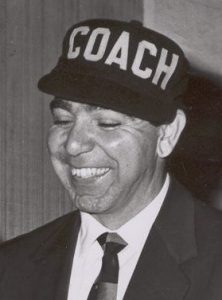Win Ellington remembers his splendid coach
Posted on: August 25,2013
Bill Raphael, the beloved coach and teacher at St. Joseph High for 41 years, died Friday of pancreatic cancer. Here, Win Ellington (St. Joe Class of ’90) remembers his mentor and the lessons learned.
When the St. Joe Alumni Facebook Page posted a status that Coach Raphael had been diagnosed with pancreatic cancer I knew that it would not too much longer when we would be receiving another status telling us that God had called Coach home. Still, while drinking my Saturday morning coffee my heart briefly stopped when I had read that Coach had passed. It has been 23 years since I graduated from St. Joseph High School, and not a day has gone by when I have not thought about Coach Raphael.
Having lived away from Jackson for the majority of that time, I have only crossed paths with Coach about about four times since high school. Still his influence on me has never diminished. Even today when I go running, which I try to do often, I still get the feeling that Coach is watching me, and I channel his motivation to push me to keep going. With thick black glasses, squared jaw, short dark hair, similar height and a fiery personality to match, Coach Raphael seemed similar to the old NFL Films I have watched of Vince Lombardi. Or as would be more accurate from my point of view, Lombardi resembled Raphael. For me, Raphael was motivation and class personified.
After sitting out for football during my sophomore year for the first time since 4th grade, I really felt that I was missing out on something that I was meant to do. Yes, I was slow, undersized and uncoordinated. I made Rudy from Notre Dame look like an All-American, but it just didn’t feel right not getting the crap knocked out of me for practically every day between August and November. So, I joined the varsity and came under Coach Raphael’s coaching during spring practice heading into my junior year to get back on track with getting knocked on my ass again, all the while wearing glasses that remained permanently fogged from the heat of my helmet.
Trying to earn Coach Raphael’s praise while undergoing this challenge was a pure honor. Through the right combination of criticism, encouragement and even humor, Coach built confidence in me. I no longer was trying to just endure the rigors of high school football just to say I did it, but to actually succeed at it and believe that I could knock somebody else on their butt too.
Playing against much bigger schools most of the time, St. Joe usually played the role of underdog. As a 5-foot-9, 175-pound lineman who didn’t see much playing time with the exception of kickoffs, I usually played the role of underdog against my own teammates during practice. It was a role that Raphael taught me to embrace and made me feel that I was as responsible for whether we won or loss as any starter was. In the book “Coach”, famed author Michael Lewis describes the influence of his own baseball coach from Newman High School in New Orleans, Billy Fitzgerald. One of the greatest passages from that book was Fitzgerald being upset with his players and saying they had not learned how to become comfortable with being uncomfortable.
While Raphael never used that line, when I read “Coach” years ago it made me think of him and what he has meant to me. It wasn’t automatic after I joined the St. Joe football team my junior year, but I really learned to appreciate the struggle and challenge of going against my own teammates and opposing players (when I got in the game) who were stronger and faster. I would have had to have been in complete denial or just pure ignorant, to not realize the starters I was going up against in practice were not better athletes. However, the motivational force of Coach Raphael would not accept excuses, and trying to earn his praise by making the starters’ jobs a little more difficult was a purpose I strove to achieve.
Learning to become “comfortable with the uncomfortable” going up against bigger and stronger players was the greatest lesson I learned from Coach Raphael. While trying to avoid using cliches, it is a lesson that extends far beyond the football field. Human nature being what it is, I don’t always succeed at it, but because of the influence of Coach Raphael I am much more conscious of the difference between doing a job half way and giving it a 100 per cent. That influence from Coach is prevalent not just in trying to accomplish major personal goals, but really just in the way you live and carry yourself in everyday life.
I had so much admiration from Coach during my high school years that I wanted to be around him every opportunity I could. As Athletic Director, Coach also had the non-glorious responsibility of making sure the concession stand during basketball games was fully operational. When football season ended he put out a call to the players to help out as concession stand basketball game volunteers.
I may have been the only one who took him up on his offer. Our concession menu consisted of Peanut M&M’s, popcorn and Pepsi products. Thanks to Coach Raphael, I discovered my niche at the popcorn machine. Coach Raphael not only taught me how to block, tackle, cover kickoffs and how to find X in Algebra II, but he also taught me how to pop popcorn correctly. After just a few tutorials, I was able to cook popcorn without burning or leaving any kernels uncooked. I became the Orville Redenbacher of the St. Joe Basketball Game Concession Stand, and I give Coach Raphael all the credit. Whether on the football field, classroom or concession stand, Coach Raphael was the ultimate teacher.
While his language may have been different, Coach Raphael pushed you to excel in the classroom just as hard as he did on on the football field. Whenever I hear somebody use the term “dumb coach” as if the two words automatically go together, I wish I could see them try to pass Coach Raphael’s AP Calculus Class, which I didn’t make the cut for either. However, I did have him for Algebra II and he had the remarkable ability to command your attention at the chalk board just as if he was in the locker room going over an opponent’s offense. Coach enlisted full class participation in solving word problems and other mathematical equations, and whenever we finally reached the correct answer, he would sum it all up by saying, “and that’s the whole ball of wax.” Raphael could be tough and demanding on the football field, but he was also an academic intellect who defied every “dumb coach” stereotype anybody has ever made.
When school started again after Spring Break my Senior Year in 1990, news reports came out that Coach Raphael had been fired. My Mom was actually teaching at St. Richard’s Jr. High at the time, and I had learned about it from her while we were spending Spring Break down in Pass Christian. It was the biggest injustice against someone I had ever witnessed. Coach Raphael had dedicated his life to St. Joe where he had taught and coached multiple generations of kids for 40 years.
As students heard the news, we took action that our Catholic education had not previously encouraged: We protested authority. In the days that followed, students and teachers wore ribbons in support of Coach. The school administration was also beginning to feel the backlash from the alumni, and a public meeting was held one night in the gym to “hash things” out. The next day without Coach Raphael asking for any of our help, the student body had one more act of defiance. When the bell rang at 10:20 to start our ten minute mid-morning break, instead of going to the cafeteria to scarf down a cheese danish like we usually did, the whole student body in complete silence put their books back in their lockers, and marched out the back of the school through the parking lot, and to the football field where we all sat in the metal bleachers.
This being our first protest, we really didn’t know what to do next. The bell rang signifying that break had ended, but we just stayed in the bleachers in amazingly complete silence. Finally after about 10-15 more minutes, another teacher came out and said that Coach Raphael wanted us to come back, so we did. Nevertheless, our message had been heard and Coach Raphael was given another year. We wanted more for him, but that’s how it was settled.
My final time with Coach Raphael took place about a month ago. Other alumni had told me or either posted on Facebook that they had had wonderful visits with Coach and were amazed at how he remembered every game he’d coached. Realizing how sick he was, I knew my window of time was small and had been trying to figure out when I could drive up from the Coast and get in my visit. Fortunately, I had a morning appointment scheduled in Hattiesburg, so I called Coach Raphael’s home and got the OK from his family to come see him that afternoon.
It had been the most time I had spent with Coach since high school and visiting with him as an adult was a very different experience. It was fascinating hearing him talk about his life. Listening to Coach describe his own experiences growing up and his service in the Navy during World War II was a real treat. I felt like an ESPN reporter interviewing a legend, and I was so caught up in it that I forgot about the suffering he was going through.
When I had entered his home and again when I was leaving, Coach commented that I looked like I was keeping in good shape and to keep doing what I was doing. Considering that so much of my experience under Coach Raphael was spent in physical exhaustion, I was honored by his comments. At the age of 87 and fighting pancreatic cancer, he was still coaching and encouraging me. He couldn’t help it. Motivating people was in his blood and what he was born to do.
Coach Raphael passed away on the first Friday of the 2013 high school football season. I’ll take it as a sign that there is football in Heaven, and God needed to fill a coaching vacancy.





